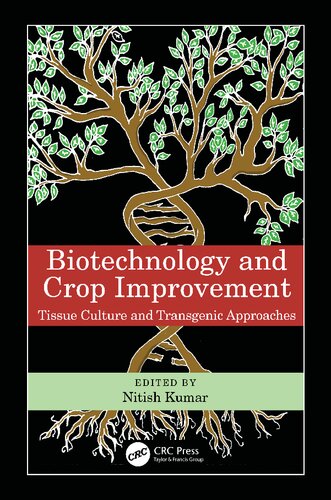

Most ebook files are in PDF format, so you can easily read them using various software such as Foxit Reader or directly on the Google Chrome browser.
Some ebook files are released by publishers in other formats such as .awz, .mobi, .epub, .fb2, etc. You may need to install specific software to read these formats on mobile/PC, such as Calibre.
Please read the tutorial at this link: https://ebookbell.com/faq
We offer FREE conversion to the popular formats you request; however, this may take some time. Therefore, right after payment, please email us, and we will try to provide the service as quickly as possible.
For some exceptional file formats or broken links (if any), please refrain from opening any disputes. Instead, email us first, and we will try to assist within a maximum of 6 hours.
EbookBell Team

0.0
0 reviewsBiotechnology and Crop Improvement
The green revolution led to the development of improved varieties of crops, especially cereals, and since then, classical or molecular breeding has resulted in the creation of economically valuable species. Thanks to recent developments in biotechnology, it has become possible to introduce genes from different sources, such as bacteria, fungi, viruses, mice and humans, to plants. This technology has made the scientific community aware of the critical role of transgenic, not only as a means of producing stress tolerant crops but also as a platform for the production of therapeutics through molecular farming. Biotechnology and Crop Improvement: Tissue Culture and Transgenic Approaches focuses on important field crops to highlight germplasm enhancement for developing resistance to newly emerging diseases, pests, nutrient- and water-use efficiency, root traits and improved tolerance to increasing temperature and introduces significant recent achievements in crop improvement using methods such as micropropagation, somaclonal variation, somatic embryogenesis, anther/pollen/embryo culture, and compressing the breeding cycle for accelerated breeding and early release of crop varieties.
Plant biotechnology has now become an integral part of tissue culture research. The tremendous impact generated by genetic engineering and consequently of transgenic now allows us to manipulate plant genomes at will. There has indeed been a rapid development in this area with major successes in both developed and developing countries. Development of transgenic crop plants, their utilization for improved agriculture, health, ecology and environment and their socio-political impacts are currently important fields in education, research, and industry and also of interest to policy makers, social activists and regulatory and funding agencies. This work prepared with a class-room approach on this multidisciplinary subject will fill an existing gap and meet the requirements of such a broad section of readers. It describes the recent biotechnological advancement and developments in plant tissue culture and transgenic. Plant tissue culture techniques such as such as micropropagation, regeneration, somaclonal variation, somatic embryogenesis, anther/pollen/embryo culture are discussed for genetic improvement of crop plant. Transgenic techniques are discussed for developing resistance to newly emerging diseases, pests, nutrient- and water-use efficiency, root traits, and improved tolerance to increasing temperature.
Key Features
This book is devoted to topics with references at both graduate and postgraduate levels. The book traces the roots of plant biotechnology from the basic sciences to current applications in the biological and agricultural sciences, industry, and medicine. The processes and methods used to genetically engineer plants for agricultural, environmental, and industrial purposes along with bioethical and biosafety issues of the technology are vividly described in the book.